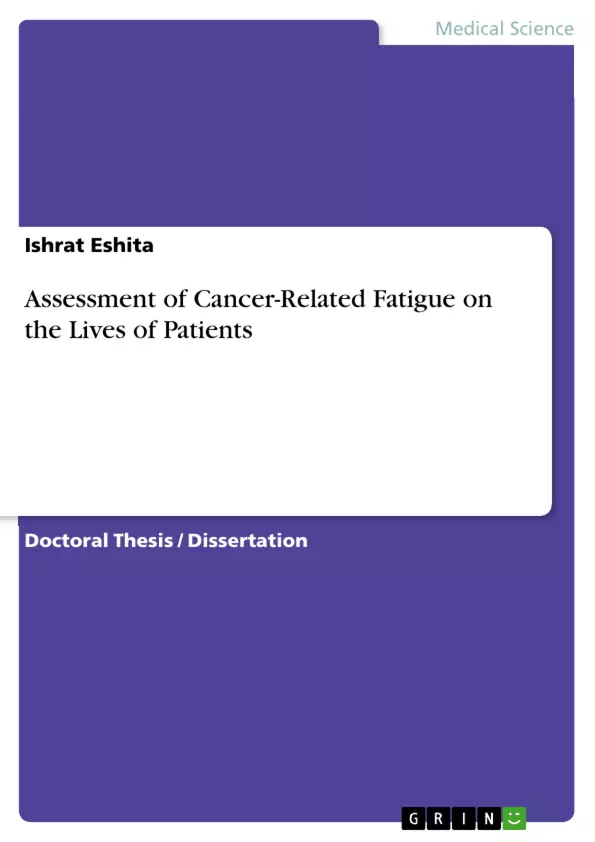A cross-sectional study entitled "Assessment of Cancer-Related Fatigue on the lives of patients" conducted at National Institute of Cancer Research & Hospital, Mohakhali, Dhaka, Ahsania Mission Cancer & General Hospital, Mirpur 13, Dhaka, and Kurmitola General Hospital, Dhaka among 267 cancer patients, has assessed the level of Cancer-Related Fatigue (CRF), using The Functional Assessment of Cancer Therapy Fatigue Scale (FACT-F), version 4, evaluates the socioeconomic impact and explores the distressing symptom on patients' functioning and Quality of Life. Data was collected by face to face interview using a Pre-tested Semi-structured questionnaire. Among 267 patients, 55.8% were male & 44.2% female. The majority (40.1%) cancer patients were in 36-55 age group. The mean age was 46.11 (SD ± 16.548) years, with minimum age 16 & maximum 83 years. [...]
Inhaltsverzeichnis (Table of Contents)
- ABSTRACT
- INTRODUCTION
- MATERIALS AND METHODS
- RESULTS
- 1. Socio-demographic Characteristics of The Respondents
- 2. Cancer & Cancer Treatment Related Informations of Respondents
- 3. Patients' Physical Wellbeing Related Informations
- 4. Patients' Family/Social/Financial Wellbeing Related Informations
- 5. Patients' Emotional Wellbeing Related Informations
- 6. Patients' Functional Wellbeing Related Informations
- 7. Assessment of Fatigue Level Using FACT-F SCALE
- 8. Association between Fatigue level and Sex group of the Respondents
- 9. Association between Fatigue level and Education of the Respondents
- 10. Association between Fatigue level and Income of the Respondents
- 11. Association between Fatigue level and Duration of Illness
- 12. Association between Fatigue level and Duration of Treatment
- 13. Association between Fatigue level and Cancer Stage of the Patients
- 14. Association between Fatigue level and Anaemia Stage of the Patients
- 15. Association between Fatigue level and Different Modalities of Anti-Neoplastic Treatment
- DISCUSSION
- CONCLUSION
- ACKNOWLEDGEMENT
- REFERENCES
Zielsetzung und Themenschwerpunkte (Objectives and Key Themes)
This study aims to assess the level of Cancer-Related Fatigue (CRF) in cancer patients, using the Functional Assessment of Cancer Therapy Fatigue Scale (FACT-F), and explore the socioeconomic impact and distressing symptom on patients' functioning and Quality of Life.
- Assessment of Cancer-Related Fatigue (CRF) levels in cancer patients
- Socioeconomic impact of CRF on patients' lives
- Association between CRF and various patient characteristics, including sex, education, income, duration of illness, cancer stage, and treatment modalities
- Impact of CRF on patients' physical, emotional, and functional well-being
- Exploration of strategies to facilitate reliable assessment of CRF symptoms
Zusammenfassung der Kapitel (Chapter Summaries)
- ABSTRACT: Provides a brief overview of the study, its purpose, methods, and key findings.
- INTRODUCTION: Defines CRF and discusses its prevalence, impact, and various contributing factors, including cancer treatment, psychological stress, and physiological changes.
- MATERIALS AND METHODS: Outlines the study design, participant recruitment, data collection methods, and statistical analysis techniques used.
- RESULTS: Presents the descriptive statistics of the study population, including demographic characteristics, cancer types, and treatment modalities. This chapter also includes the findings on the prevalence and severity of CRF, as well as the associations between CRF and various patient characteristics.
Schlüsselwörter (Keywords)
Cancer-related fatigue, CRF, FACT-F scale, socioeconomic impact, quality of life, cancer patients, treatment modalities, anti-neoplastic treatment, fatigue assessment, prevalence, severity, association, demographic characteristics, cancer stage, anemia, physical well-being, emotional well-being, functional well-being.
Frequently Asked Questions
What is Cancer-Related Fatigue (CRF)?
CRF is a distressing, persistent, subjective sense of physical, emotional, and/or cognitive tiredness related to cancer or cancer treatment that is not proportional to recent activity.
How was fatigue measured in this study?
The study utilized the "Functional Assessment of Cancer Therapy Fatigue Scale" (FACT-F), version 4, to evaluate the level and impact of fatigue on patients.
What patient demographics were included in the research?
The study involved 267 cancer patients in Dhaka, with a mean age of 46 years. 55.8% were male and 44.2% were female, mostly within the 36-55 age group.
Does the stage of cancer affect the level of fatigue?
Yes, the study investigates the association between fatigue levels and various factors, including the stage of cancer and the presence of anemia.
What impact does CRF have on a patient's quality of life?
CRF significantly affects physical, emotional, social, and functional well-being, often leading to socioeconomic challenges and decreased overall quality of life.
Which cancer treatment modalities were studied in relation to fatigue?
The research looked at various anti-neoplastic treatments and their association with the severity of fatigue experienced by the respondents.
- Quote paper
- Ishrat Eshita (Author), 2017, Assessment of Cancer-Related Fatigue on the Lives of Patients, Munich, GRIN Verlag, https://www.grin.com/document/353056



